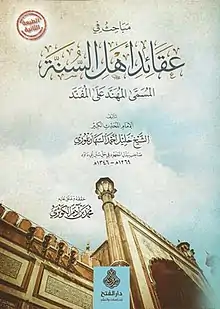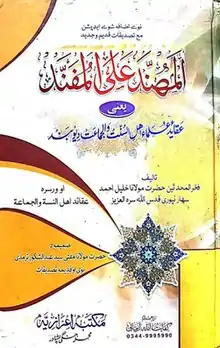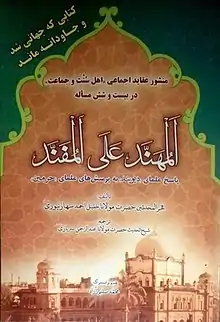Al-Muhannad ala al-Mufannad
Al-Muhannad 'ala al-Mufannad (Arabic: المهند على المفند, lit. 'The Sword on the Disproved'), also known as al-Tasdiqat li-Daf' al-Talbisat (Arabic: التصديقات لدفع التلبيسات, lit. 'Endorsements Repelling Deceits'), was subsequently published in Urdu as 'Aqa'id 'Ulama' Ahl al-Sunna Deoband (The Beliefs of the Sunni Scholars of Deoband) is a book that expresses some of the beliefs held by the Sunni Hanafi Deobandis. It was authored by the Indian Hanafi-Maturidi hadith scholar and Sufi master Khalil Ahmad al-Saharanpuri (d. 1346/1927), who wrote a commentary on Sunan Abi Dawud, entitled Badhl al-Majhud.[1] [2]
 | |
| Editor | Muhammad ibn Adam al-Kawthari |
|---|---|
| Author | Khalil Ahmad al-Saharanpuri |
| Original title | المهند على المفند |
| Working title | مباحث في عقائد أهل السنة |
| Translator | Translated into Persian by 'Abd al-Rahman Sarbazi |
| Country | |
| Language | Arabic, Urdu, Pashto, and Persian |
| Publisher | Dar al-Fath, Jordan (Revised Arabic edition), Library of Darul Uloom Karachi |
| Pages | 150 |
| ISBN | 9789957234409 |
| The book answers the 26 most common questions people have about 'aqidah of Sunnis, according to Deobandis. | |


The book is not an independent book on creed, but rather a compilation of questions and answers which were asked by the Arab scholars at that time. These questions were sent to the Deobandi scholars by Husain Ahmad al-Madani, who was living in Medina, so Saharanpuri responded and answered them, and then these questions and answers were compiled into a book and were printed under the name of al-Muhannad 'ala al-Mufannad.[3] Since most of these questions were related to beliefs, and in the correct jargon, were related to the branches which pertain to beliefs and the science of Kalam, it became published under the title of Mabahith fi 'Aqa'id Ahl al-Sunna (Arabic: مباحث في عقائد أهل السنة, lit. 'Discussions in the Beliefs of the People of Sunna').[4]
Summary
The text succinctly summarizes Deobandi perspectives on a range of controversial issues, such as: the ruling on Wahhabis, the ruling on celebrating Prophet Muhammad's birth (al-Mawlid al-Nabawi), whether the Deobandis believe it commendable to visit the Prophet Muhammad's grave (they do, according to Saharanpuri), whether intercession (tawassul) through the Prophet or saints is permissible (it is, so long as one understands the power to intercede comes from God), whether the Prophet is living in his grave (he is), whether it is permissible to send salutations to the Prophet (it is), whether any part of creation is better than the Prophet (it is not), whether the Prophet is the seal of the Prophets (he is), and the possibility of the occurrence of lying or reneging on a promise, among other topics and issues that were raised by various sects of Islam towards Deobandi scholars.[5]
Publication history
According to Muhammad ibn Adam al-Kawthari, the book first appeared in the 1325 Hijri year.[2]
Revised Arabic edition
The edited version of Al-Muhannad ala al-Mufannad by Muhammad ibn Adam al-Kawthari, entitled Mabahith fi Aqa’id Ahl al-Sunna al-Musamma al- Muhannad ala al-Mufannad was first published in Arabic in 2004 in Amman (Jordon) by Dar al-Fath for Research and Publishing and copies of it are available in bookshops in many Arab counties such as Syria, Jordon, UAE, Yemen and Egypt. [2]
Quotes
Here are some quotations from the book:
Ruling on following one of the four schools of law
It is necessary for a man in this time to imitate one of the four imams[Note 1] – Allah Exalted is He be pleased with them – rather it is obligatory, for indeed we have experienced frequently that hopes to abandon taqlid of the imams and follow the opinions of one's self and its desires is descent into the pit of apostasy and heresy – Allah protect us from it – and due to this, we and our mashayikh (scholars or teachers) are imitators in fundamentals and peripherals of the Imam of the Muslims Abu Hanifah – Allah Exalted is He be pleased with him – Allah cause us to die on it and gather us in his band. Our mashayikh (scholars or teachers) have many compilations on this, spread and well-known in all regions [of the world]. — Al-Muhannad 'ala al-Mufannad (Question Eight, Nine and Ten)
Ruling on Wahhabism
Their ruling according to us is what the author of al-Durr al-Mukhtar said: "The Khawarij are a violent group that rebelled against 'Ali due to an interpretation by which they believed that he was on falsehood and disbelief or disobedience making fighting him obligatory according to their interpretation. They legitimise our bloods and our properties and they insult our women," until he said: "Their ruling is the ruling of rebels," and then he said, "We do not anathematise them only due to it being from interpretation although false." Al-Shami said in his marginalia: "As has occurred in our time in the followers of 'Abd al-Wahhab who came out from Najd and dominated the two Harams and would claim to belong to the madhhab of the Hanbalis but they believed that they are the Muslims and those who disagreed with their belief are polytheists, and due to this they legitimised the slaughter of the Ahl al-Sunnah and the slaughter of their 'ulama until Allah broke their supremacy." — Al-Muhannad 'ala al-Mufannad (Question Twelve)
Issue of the possibility of lying
That which they attributed to the eminent and incomparable shaykh, the scholar of his time, the peerless of his age, Mawlana Rashid Ahmad Gangohi, that he said that the Creator (Exalted is His Eminence) actually lied and that the one who says this has not erred, it is a fabrication about him (Allah Most High have mercy on him) and is from the lies concocted by the deceptive and lying devils (Allah confound them! How they are perverted!). His respected person is innocent of such heresy and disbelief. The fatwa of the shaykh that was printed and published in volume one of his Fatawa Rashidiyyah (p. 119) falsifies their [claim].[11] — Al-Muhannad 'ala al-Mufannad (Question Twenty Three)
Reception
Several prominent scholars praised the book, including Mahmud Hasan Deobandi, Ashraf Ali Thanwi, Muhammad Shafi' Deobandi, Muhammad Yousuf Banuri, Muhammad Tayyib Qasmi, Zafar Ahmad Usmani, Mahmud Ashraf 'Usmani, and Selim al-Bishri (chief Maliki mufti and Grand Imam of Al-Azhar), and others.[3]
Notes
- The four imams are the founders of the four schools of law: Abu Hanifa (d. 767), Malik ibn Anas (d. 795), Muhammad ibn Idris al-Shafi'i (d. 820) and Ahmad ibn Hanbal (d. 855).
References
- Asir Adrawi. Tazkirah Mashāhīr-e-Hind: Karwān-e-Rafta (in Urdu) (2nd, April 2016 ed.). Deoband: Darul Muallifeen. p. 88.
- Muhammad ibn Adam al-Kawthari (ed.). "Have you edited the Deobandi Aqida Book 'Al-Muhannad' and Where Can I get a Copy?". Darul Iftaa (Institute of Islamic Jurisprudence). Retrieved 28 September 2020.
- "المهند علي المفند عقائد اهل السنت علماء ديوبند". bawar.net (in Pashto).
- Khalil Ahmad al-Saharanpuri. "Mabahith fi Aqaid Ahl al-Sunnah". alkunuz.co.uk.
- Brannon D. Ingram (2018). Revival from Below: The Deoband Movement and Global Islam. University of California Press. p. 254. ISBN 9780520970137.
- "المهند علی المفند» نگهبان عقاید دیوبندیه»". adyannet.com (in Persian).
- "واجب بودن تقلید از نظر اهل سنت و تکفیر مقلدین توسط وهابیت [مصادر اهل سنت]". modafeemamat.blog.ir (in Persian).
- "آیا روایت پاداش زیارت امام رضا علیه السلام با روایت شدّ الرّحال مخالف نیست؟". valiasr-aj.com (in Persian).
- "دانلود کتاب المهند علی المفند". smyazdani.com (in Persian).
- "Tawassul - Opinion of Contemporary Hanafi Scholars on Permissibility". Tebyan Cultural Institute.
- "Repelling the Deceits of Al-Barelwi on the Issue of Imkan al-Kadhib". Deoband.org.

